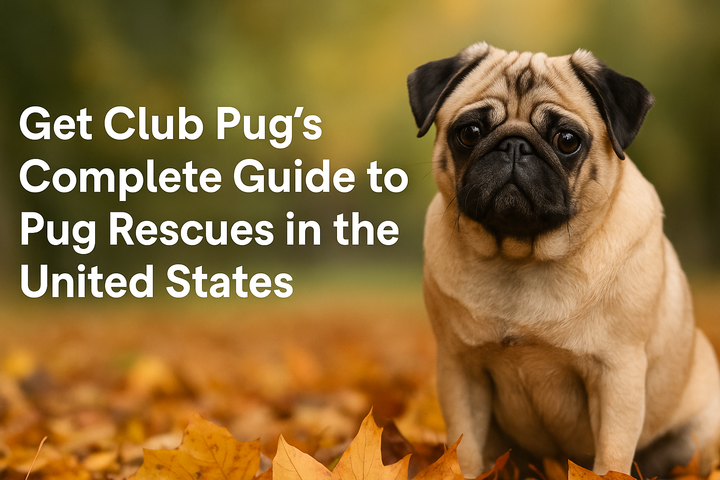How to Find, Choose, and Evaluate a Pug Breeder: A Club Pug Guide to Responsible Pug Parenthood
A responsible breeder lays the foundation for your pug's health, behavior, and lifespan. Here we’ll walk you through how to find a reputable pug breeder, what questions to ask, red flags to avoid, and how to ensure your future pug comes from a place of love and ethical care.

If you're dreaming of bringing home a pug puppy, choosing the right breeder is one of the most important decisions you'll make. A responsible breeder lays the foundation for your pug's health, behavior, and lifespan — while a bad breeder can lead to heartbreak, expensive vet bills, and unethical practices.
In this Club Pug exclusive, we’ll walk you through how to find a reputable pug breeder, what questions to ask, red flags to avoid, and how to ensure your future pug comes from a place of love and ethical care.
🔍 Step 1: Where to Find Responsible Pug Breeders
Skip online classifieds and social media sellers — reputable breeders rarely advertise this way. Instead, use trusted sources like:
- The American Kennel Club (AKC) Marketplace
- Pug Dog Club of America (PDCA) breeder directory
- Breed-specific events or dog shows
- Veterinarian referrals
- Direct personal referrals
💡 Tip: A good breeder doesn’t just sell puppies — they breed for health, temperament, and the long-term well-being of the pug.
🧠 Step 2: Questions to Ask a Pug Breeder
Once you’ve found a potential breeder, interview them like you would a babysitter or medical provider. A quality breeder won’t mind — in fact, they’ll expect it.
✅ Ask about their breeding program:
- How long have you been breeding pugs?
- Are you an AKC-registered breeder?
- Do you breed for health, temperament, or conformation standards?
- Can I meet the parents of the litter? This is also a great opportunity to visit the breeder's home to ensure you are working with a responsible and conscientious breeder, and that the parents and puppies are being raised in a clean, loving and caring environment. And this in particular will help protect you from puppy scams that are unfortunately so prevalent out there.
- Do you have a waiting list? If so, what is needed to secure a place on the waiting list?
✅ Ask about health and screening:
- Do you perform health testing for common pug conditions (e.g., BOAS, PDE, hip dysplasia, eye problems)?
- Are puppies vet-checked before going home?
- Will I receive vaccination and deworming records?
✅ Ask about the puppies:
- How are the puppies socialized?
- At what age can they go home (must be at least 8 weeks)?
- Do you offer a health guarantee or return policy? This typically covers serious health issues that may arise during the first year of the puppy's life.
- Can I meet the puppies in advance? (This is often related to the following question on puppy selection.)
- Will I get to pick my puppy, or what is your puppy selection process?
✅ Ask about paperwork and support:
- Do you provide a contract and puppy care guide?
- Are you available for questions after adoption?
- Will the puppy come with AKC registration?
🚨 Red Flags to Watch For
- A breeder who is unwilling to have you visit their home to meet the parents or other pugs bred in advance of leaving a deposit.
- Social accounts that uses "stolen" photos of other pugs on the Internet. Many fake breeders download puppy photos from other accounts and show these as available puppies. Ironically, they tend to use the pugs' real names, so you could do an Internet search to see if another related account pops up.
- Disparity in market pricing. Often times scammers will offer a price that is considerably lower than other breeders to attract more people.
📋 Checklist: What a Responsible Pug Breeder Should Provide
- ✅ Detailed health screening of breeding dogs
- ✅ AKC or equivalent registration (with documentation)
- ✅ Clean, safe, and loving environment for puppies
- ✅ Proof of early socialization
- ✅ Vaccination and vet records
- ✅ Written contract with return policy
- ✅ Lifetime breeder support
🐾 Bonus: Does AKC Registration Mean a Breeder Is Ethical?
Not necessarily. AKC registration only confirms pedigree — it doesn’t guarantee humane practices. Always look beyond registration and evaluate how the breeder cares for their dogs and puppies.
Look for health-tested lines, transparent policies, and breeders who prioritize the breed over profit.
❤️ Final Thoughts: Choose with Your Head and Heart
Bringing home a pug puppy is exciting — but don’t rush it. Take the time to do your research to make sure the breeder you've selected is legitimate, ask tough questions, and build a relationship with your breeder. The right one will become part of your pug’s support system for life.



Comments ()